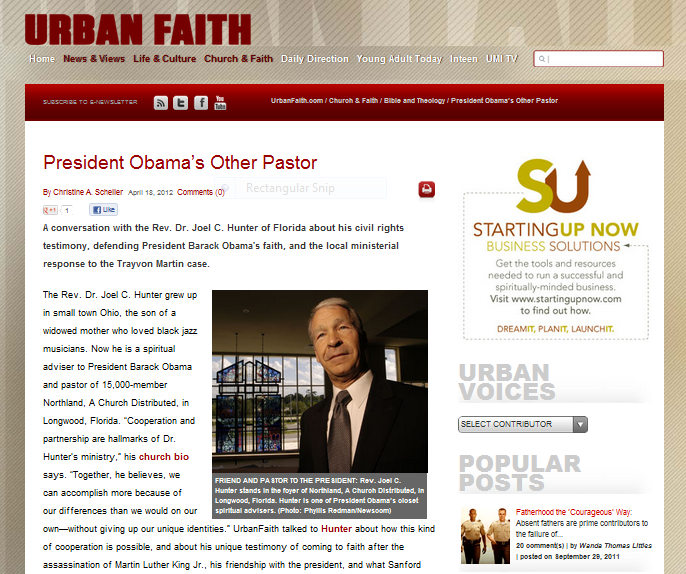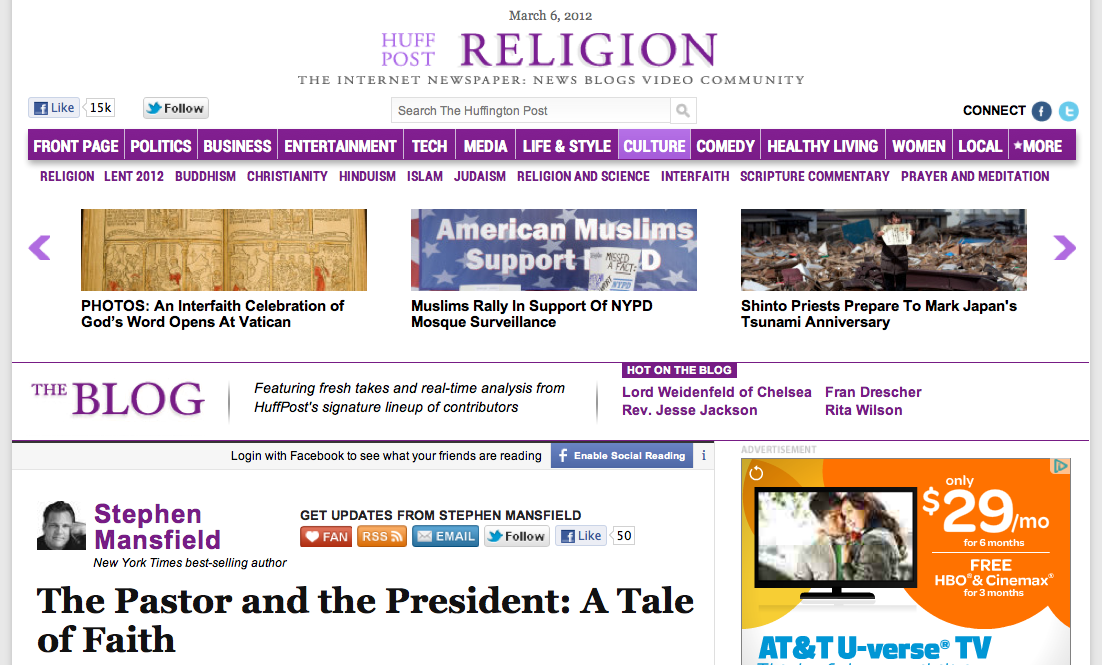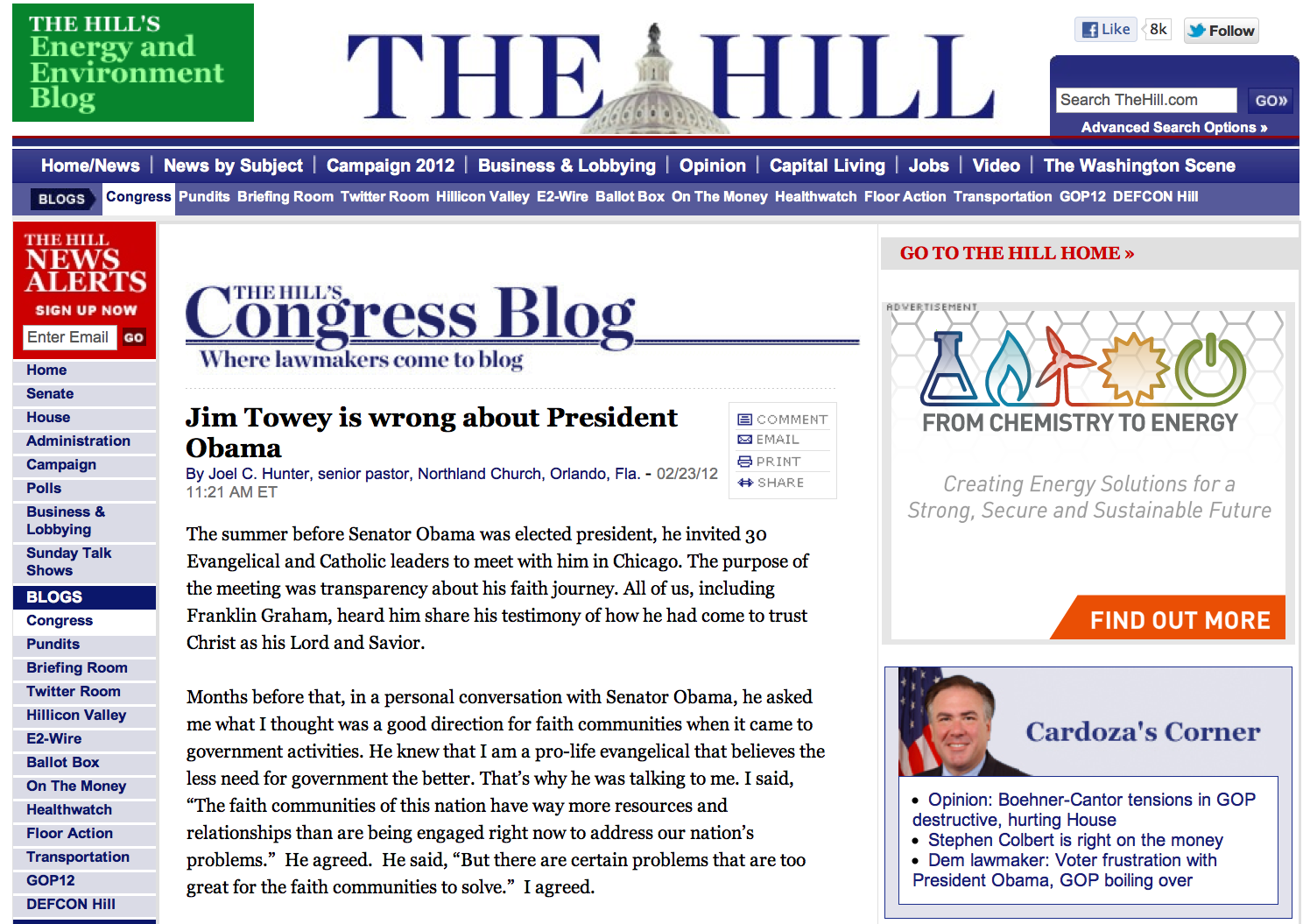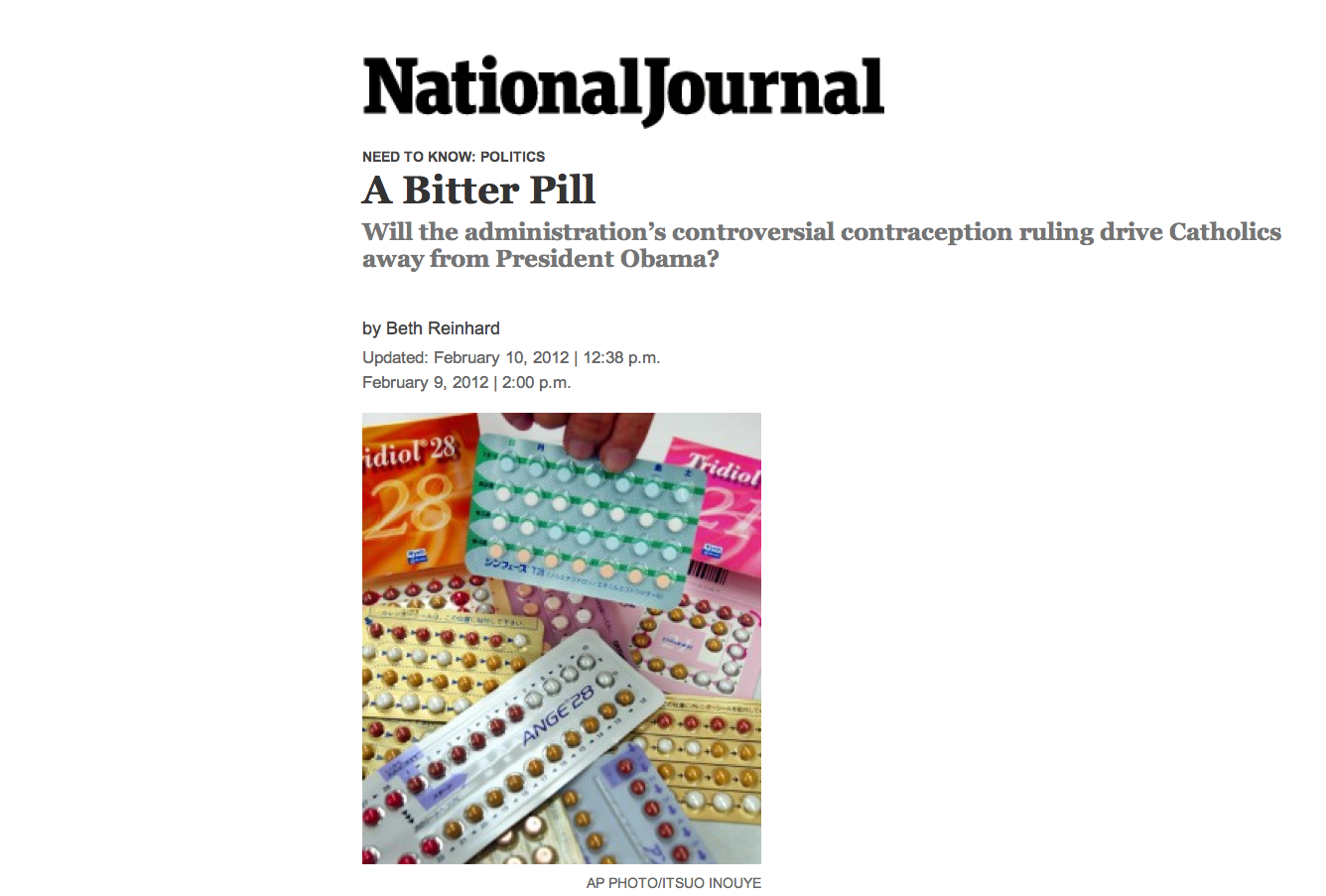 A conversation with the Rev. Dr. Joel C. Hunter of Florida about his civil rights testimony, defending President Barack Obama's faith, and the local ministerial response to the Trayvon Martin case.
A conversation with the Rev. Dr. Joel C. Hunter of Florida about his civil rights testimony, defending President Barack Obama's faith, and the local ministerial response to the Trayvon Martin case.
FIND THIS ARTICLE AT: http://www.urbanfaith.com/2012/04/the-pastor-the-president-and-civil-rights.html/
The Rev. Dr. Joel C. Hunter grew up in small town Ohio, the son of a widowed mother who loved black jazz musicians. Now he is a spiritual adviser to President Barack Obama and pastor of 15,000-member Northland, A Church Distributed, in Longwood, Florida. “Cooperation and partnership are hallmarks of Dr. Hunter’s ministry,” his church bio says. “Together, he believes, we can accomplish more because of our differences than we would on our own—without giving up our unique identities.” UrbanFaith talked to Hunter about how this kind of cooperation is possible, and about his unique testimony of coming to faith after the assassination of Martin Luther King Jr., his friendship with the president, and what Sanford area ministers are doing in response to the shooting death of Trayvon Martin. The interview has been edited for length and clarity.
UrbanFaith: You have a unique testimony in that you were involved in the Civil Rights Movement and came to the Lord after the assassination of Martin Luther King, Jr. You also recently wrote an op-ed for Charisma about the Trayvon Martin case. Has racial reconciliation always been a thread in your ministry?
Joel C. Hunter: Yes, it has been. The little town I came from in Ohio didn’t have one ethnicity other than white. I think it was one of those Midwestern towns that had a law about the exclusivity of races. But my mother, who reminds me in some ways of President Obama’s mother, was one of those free spirits who loved everybody and thrived on Jazz: Nat King Cole and all of those great—back in that day they were called “Negro geniuses” with music. And so, when I went to Ohio University, it was a natural thing for me to go to the other end of the spectrum and get involved almost immediately with the Civil Rights Movement. It wasn’t from a faith perspective that that first happened, but when Martin Luther King, Jr. was assassinated, I went to Galbraith Chapel, a little generic chapel at Ohio University, and came to Christ. Caring for those who are left out was at the core of my calling to ministry and that’s always been.
Now that there has been an arrest in the Trayvon Martin case, have things settled down in the Sanford area?
We are in the same county and I’m actively meeting with ministers from Sanford, being led by the African American ministers. We have another meeting scheduled for tomorrow night about how we can take our community toward, not just reconciliation and healing, but toward improvement because of what has happened here. We’ve had ongoing meetings together: prayer meetings and brainstorming meetings. We may have a community memorial service with the Martin family. I’m not sure. The publicity has somewhat died down now, but the ministers and spiritual leaders are much more conversant, active, and cooperative than we’ve ever been. So, I’m thinking God is really going to do something wonderful from this.
As a pastor who comes from a relatively humble upbringing, how do you keep being a spiritual adviser to the president of the United States in perspective?
I don’t know how this happens, but it’s really true: people are people to me. The president is a person. He’s great about this; he has a great sense of humor and he’s very personable, so it’s not like this is a lot of work. I realize that to the world, it’s a long way for a kid from Shelby, Ohio (where the largest buildings literally are the grain elevators for the farmers), but to me he’s a person and the job of a pastor is to help the person in front of him or her to get closer to God. And so, that’s exactly what I do.
I remember a time when I had had a conversation and a prayer with the president and within 24 hours I was back at my church talking to a AIDS-infected prostitute who wanted to get closer to the Lord. It struck me that my conversation with her resembled very closely the conversation I had had with the president less than 24 hours previous. To me, that was the ultimate. That’s what a pastor does. Each person has the same value in God’s eyes. I didn’t count one of those conversations more valuable than the other.
When your five-year-old granddaughter Ava passed away from glioblastoma in 2010, the president called you and prayed with you. How do you respond to criticism of his faith when you’ve been so personally engaged with him on a spiritual level?
The president called me when Ava was first diagnosed and then, of course, he called me when she passed away, so it was very tender and kind thing for him to do. I understand that people are ignorant, that is they lack knowledge about his faith walk. I realize there is some political agenda when people accuse him of not being a Christian. I’m not naïve about that, but the president and the candidate Barack Obama chose—even more after he was president—not to make his faith walk very public because he knew it would be politicized and that’s an area of his life he didn’t want politicized.
I always say that nature hates a vacuum and when you don’t have a lot of information, you will fill it in with your latest email. That’s exactly what happens. I know from personal experience and from many personal conversations that they’re wrong. I know his daily practice of reading Scripture. I write many of those devotions. Our prayer times in the Oval Office, over the phone, and on special occasions have been just as sweet and participatory as you can imagine. Of course, there’s always the defensiveness for a friend. I consider the president a friend and any time a friend is wrongly accused, you want to defend them. But, by the same token, I can’t really go much further, because this is the president and I don’t want to give a lot of information that is not directly related to his role and official duties. So, I have to be very careful about not saying too much.
You were on a press call defending President Obama’s faith around the time the Rev. Franklin Graham publicly questioned it. How do you address other Christian leaders who cast doubt on the president’s faith?
I can and do openly tell them about my personal relationship with the president and my personal knowledge of his spiritual life. Sometimes I say I wish most of the people in my congregation were as attentive to reading the Bible every day, praying every day, and trying to put their faith into practice as the president is. Some of them are really taken aback, because they just don’t have the knowledge. It’s not covered in the media by design. That’s fine. I’m very open about my personal knowledge of his walk.
I heard the president debate Sen. John McCain at Saddleback Church in 2008. He seemed more articulate and comfortable talking about faith than McCain then and continues to sound more comfortable and articulate talking about faith than some other candidates now. Do you attribute doubts about his faith to politics or to his policy positions on issues like abortion?
It’s kind of all of the above. I think a lot of it is politically driven. I also think there’s some racism attached in this. I don’t play the race card, but I do think that because his father was from a different country (not faith, because his father wasn’t a man of faith) and with the hyper-sensitivity about Islam, there’s been an effort to paint this man as being very different because he does come from a unique background.
In that particular debate with McCain, he said something that didn’t quite come out right; he was a little too flip about it. When questioned about when life begins, he said, “That’s above my pay grade,” or something like that. Because he is such a respectful thinker in terms of religious questions, he won’t give the reflexive responses. When he didn’t say the axiom that “Life begins at conception,” he was hearkening back to something that is not particularly addressed in Scripture. If we don’t come from a particular faith tradition that says this is the dogma of my church and you simply look to Scripture, “Does life begin at conception?” is an open question. And so, part of this is because he is very careful not to give just the patently religious responses, or the religious platitudes. When people don’t get those, then they begin to say, “Maybe he’s not a Christian like others that have given us boiler-plate Christianity.” I would say to that: he doesn’t pretend to be a theologian, but he really does want to search the Scriptures authentically and personally, and it’s because he takes it so seriously and so personally that he won’t automatically give the response that everybody is looking for.
Is there a level of theological illiteracy on the part of the general public that contributes to this kind of misunderstanding?
Absolutely. In cultural Christianity in general there is, but specifically, the more fundamentalist versions of Christianity have shibboleths: “You have to say the right thing with the right accent or you’re not really one of us.” Part of the problem is not his level of sophistication, but ours, not his level of thinking, but our lack of more broad-based responsiveness to the depths of the theology of Scripture. When you don’t come with automatic or dogmatic sound-bite answers, that’s a good thing. That’s a sign of personal engagement. But because we would rather just have a category of correct belief and many people are satisfied with that, then we are the ones making ourselves upset. It’s not because he’s not answered adequately; it’s partially our discomfort at not having simple answers. That’s part of the unease with his particular faith walk.
The president comes down on the side of keeping abortion legal and you are pro-life. How do you, or anyone else, preserve relationships with other believers when there are such deep disagreements over these kinds of issue?
Abortion is probably the premiere issue where we see this. I am pro-life; therefore I think that’s a baby. I don’t happen to subscribe to “It’s a baby at conception,” because I don’t see that in Scripture, but I do believe that soon after that baby is implanted in a womb, it becomes a person. So I think abortion is homicide. Having said that, the way that I want to work with other Christians who don’t have the same theological presumption that I do about the personhood of a developing fetus is to keep my eyes on the goal. My goal is to have no abortions some day, ultimately because no woman decides to do that.
Other people say, “How can we reduce, by practical common sense, the number of abortions?” I’m on board. Every baby that can be saved, I think, is invaluable. And so, if I talk to somebody who is pro-choice and they say, “A lot of abortions come from feeling financial pressure or because people are afraid they won’t be able to complete their education, and if we could relieve that kind of pressure, they would carry their baby to term,” I’m all over that. I don’t have to have an all or nothing. That’s why the president and I, even though we would disagree probably on who should be able to get an abortion, we still can agree on the reduction of abortion as a very important goal together. That’s kind of how I walk that through.







